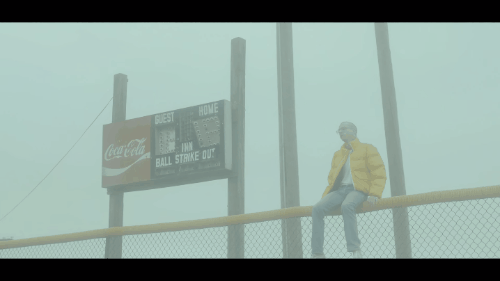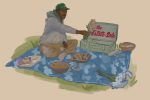The Nashville dark-pop savant is combining his confessional songwriting with a sultry, haunting sound.
James Droll, a recording artist based in Nashville, is currently in the midst of whittling down his discography into a track list for his first album, which he plans to release this summer. The title of the release, like its contents, is still in mental utero, but he long ago decided on its cover art. “I grew up on a llama farm,” says Droll, “and there’s a picture of me at the Ohio State Fair when I was 10 or 11 showing my llama. When I found the photo, I said to myself, ‘This has to be it.’”
The irony of the selection is palpable. Though he now lives and work in Tennessee, Droll was raised in rural Ohio, in a conservative community whose oppressiveness both stifled and sparked his musical genesis. As a young man, Droll realized early in his life that he was gay, but he understood that his sexuality would be condemned if he told anyone. So he kept his orientation a secret, and began writing songs as a release. The photo of Droll at the fair, then, is a microcosm of a musician come full circle: the same environment that pushed him to bury a part of his identity is responsible for giving him the tools to express it.
I met Droll at Cheer Up Charlie’s, a bar in Austin, during South by Southwest. The budding pop star had played a show the previous night, as well as an acoustic set and a spot at the BMI showcase in the days prior. Before the performances, though, Droll had been participating in the festival’s annual songwriting workshop, as, in addition to his musical career, the Nashville artist has built a successful career for himself as a professional songwriter.
In fact, long before Droll began releasing his own music, he established himself as a talented industry songwriter who had a penchant for penning bespoke tracks that he hand-tailored to their performer. “I’m a bit of a perspective junkie,” says Droll. “I’ve only lived my life, so I love hearing about other people’s problems.”
His aptitude for songwriting stemmed from his days as a closeted Ohio teenager, but his abilities first saw the light of day in college, when he joined a band called Aristo while at the University of Cincinnati. The pop-punk group, which they named after Droll’s great grandfather, began touring, and he quickly realized that he was unable to stay on top of his academics while on the road. He dropped out of school to take the band seriously, but Aristo soon fell apart and the young songwriter found himself untethered.
To stay ahead of his bills Droll began bartending, which soon led to an opportunity to help open a bar in Nashville. He had been dating someone long-distance who lived in the city, and Droll was already looking for a reason to leave Cincinnati. He moved to Tennessee with high hopes, but the relationship soon crumbled and Droll, for the first time in a serious way, began writing music.

It was around this time that he wrote “Wall,” the first of many songs whose inspiration would come from heartbreak. “And my tears won’t fall for you like I did,” he wrote. And later, “I should’ve known better / I could’ve saved us some time.”
Sonically, the track marks a divestment from his pop-punk background, as it was the first time Droll began earnestly exploring his own voice. “I thought,” says Droll, “Why don’t I start making music that’s not made, exactly, to be listened to, but music that I want to make just for myself?”
“Wall” bears all the characteristics of what would soon come to be Droll’s trademark, dark-pop style. First, it concerns heartbreak, an underlying motif of many of the songs he would write over the next several years.
Second, in its swelling synths and sultry, R&B-esque bassline, the track staked out his musical territory. Many of his songs blend the melancholy of a James Blake melody with the electronic sensibilities of a Disclosure track, and the combination, like much of Droll’s music, gives off a sense of resigned hopefulness.
The next year, in 2017, Droll released a handful of songs, including “Jacket Weather” and “Bad for You,” which share a number of similarities to “Wall.” “Keep my name up out your mouth,” he sings in “Jacket Weather” over a soft piano with metronomic fingers snapping in the background.
In “Bad for You,” Droll continues the theme. “I see conclusions you’ve been coming to / And I can’t tell you what you’re supposed to do / Just know that I’m bad for you,” he sings. Here the melody is even more muted, as a synth blinks rhythmically in the song’s rafters like a flickering neon light.
His songs, especially at this time, also start to make mention of darker themes, like death, suicide and mental unwellness. In “Jacket Weather,” Droll plays off the phrase “going to hell in a hand basket,” singing, “We’re running out of baskets / Would you like to try a casket?” And in “Bad for You”: “I showed the knife, before you bury me / I bit the bullet that was meant for you.”
Of these lines, and more like them in other songs, Droll admits to a history of mental health struggles. Years of repressing his emotions as a teenager had left the songwriter stunted, unable to open up freely to those who cared about him. There was a time when I came out,” says Droll, “when I was 21, where I decided I’m either going to tell my parents that I’m gay or I’m going to kill myself. At that point, in that situation, you work yourself up to thinking that those are your only options.”
Since then, Droll has actively worked through many of these issues, and he’s happy to have found himself in a loving, healthy relationship. The allusions to mental unwellness that pockmarked many of his tracks haven’t disappeared completely, as he sings in his 2019 song, “Cut My Teeth,” “So blue you call me sapphire.” But he admits that his darker lyrics, nowadays, often come from him mentally mining the darker days of his past, rather than reflecting his current state of mind.
Given that now he is in a better place mentally, but that much of his music is fueled by romantic despair, the situation begs the question: What is he going to write about now? “I would love to have that problem,” laughs Droll.“ Right now it’s not an issue, but I would be okay with being so content that I have no more negativity to dredge up.”
Droll plans on dropping his first album in the coming months, and fans are understandably besides themselves with anticipation. The natural songwriter has finally found his voice, and any music on the horizon promises to blend his elegant sound with his confessional lyricism. “It’s all about moving toward whatever I want to do,” says Droll. “You start finding what you’re looking for when you stop looking for other people’s approval.”




















